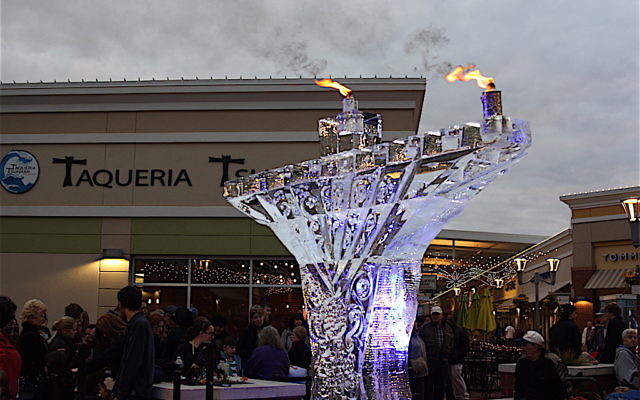Military Might, Miracle Battle for Narrative
The miracle of Chanukah was not always the focal point of the festival.
Eight days and eight nights the oil burned, although it was to last for but one.
This story of divine intervention defines our regard for a holiday that we often allow to take short shrift compared with its seasonal behemoth of a cousin (once removed). But this Chanukah miracle was not always the focal point of the festival.
There is little textual basis for the focus on the oil miracle, whose likely origin dates to the beginning of the rabbinic era, said Rabbi Michael Berger, an associate religion professor at Emory University.
Every summer the professor has made a point of lecturing Jewish educators at Ken Stein’s Center for Israel Education teacher enrichment workshop on the relevance of the Chanukah narrative to Zionism, its evolution through Jewish history and its pertinence to the modern Jewish state.
The story of one flask of oil miraculously lasting eight days until new oil could be pressed and kashered was taught not to inspire religious fervor, but to tamp down radical zealotry. The intention was not spiritual but pragmatic.
After the destruction of the Second Temple and the establishment of Roman military law throughout the province of Palestine, Jews sought inspiration from the story of the Maccabees, who overthrew Seleucid-Greek control of Jerusalem and purged the Temple of impurity.
The Maccabean revolt was a story of human determination and earthly action. Chanukah was a commemoration of this military victory, and the divine role was limited to the Jewish rebels’ inspiration.
After the failure of the Great Jewish Revolt (66-73 C.E.), many Jews evoked the memory of Judah Maccabee as evidence that it not only was possible to overthrow oppressors and free Jerusalem, but it also was the ordained responsibility of Jews, whose relationship with the one true G-d predestined their victory.
It did not. In 132, a leader named Simon Bar Kochba capitalized on this popular Jewish sentiment and launched a desperate revolt that would match or surpass that of the Maccabees. Bar Kochba had early success but was crushed by 135. Ancient sources, known for exaggeration, estimated that up to 1 million Jews died.
What’s certain is that Jerusalem was left as a Roman colony, and most Jews were driven out of the land of Israel. For more than 1,800 years, Judaism would be a religion of the Diaspora, decentralized and scattered, forcing evolution or dissolution.
Reeling from Bar Kochba’s failure and systematic Roman oppression, the rabbis saw a need to dissuade Jews from the belief that they were masters of their own destiny. They set out to dispel the ideology inspiring insurrection. Stories of Jewish military might were regarded as dangerous, foremost that of the Maccabees.
So the story of Chanukah got a makeover, shifting from military might to divine miracles. In response to prayer, good deeds and Jewish living, G-d would deliver us to the land of Israel; we would not redeem the land through direct action.
For nearly two millennia this approach dominated the Jewish attitude toward Israel until a surge in anti-Semitism late in the 19th century inspired the modern Zionist movement.
The Zionists took it upon themselves to reclaim the lost parts of Jewish history, including the military prowess of Judah Maccabee. As a result, we have dueling narratives, military and miraculous, as we celebrate the Festival of Lights.
Continuing vigorous discussion of these narratives is important. As the original Diaspora rabbis realized, how we relay our past can dramatically affect our future.
As you gather with your family to celebrate Chanukah, you may take a moment to consider the history of this conflict over narrative. What impact will your accounting have on future generations of Jews? What obligation do you have to the legacy of Jews who took up arms against oppressors and to the memory of those slaughtered through the millennia? What Chanukah story will you tell?




comments